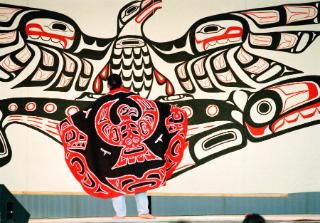OECD Rural development and rural well-being
Linking Indigenous communities with regional development
This project was launched on 19 September 2017 at Wendake First Nation, Canada. It includes country case studies and a pan-OECD report that offers policy recommendations for OECD member and non-members under the auspices of OECD Regional Development Policy Committee. This work has closely involved Indigenous leaders and communities in Australia, Canada and Sweden—a network which we hope to expand in the future as we continue work on this topic.
There are approximately 38 million Indigenous peoples across 13 OECD countries
Indigenous peoples are defined by the United Nations as those who inhabited a country prior to colonisation, and who self-identify as such due to descent from these peoples, and belonging to social, cultural or political institutions that govern them. They have unique assets and knowledge that address global challenges such as environmental sustainability and that contribute to stronger regional and national economies.
Implementing the UN Sustainable Development Goals for Indigenous Peoples
- End poverty in all its forms everywhere
- Reduce inequalities within and among countries
Across far too many indicators there are significant gaps between Indigenous and non-Indigenous populations
|
Indigenous peoples represent about 5% of the world’s population, but they comprise 15% of the world’s extreme poor and one-third of the rural poor (UN). These gaps are larger in rural and remote areas. For example, gaps in the employment rate between Indigenous and non-Indigenous peoples living in urban regions is on average 8.4 percentage points across a sample of OECD member countries (Australia, Canada, Mexico, New Zealand, Sweden and the United States) whereas it is 20.2 percentage points in rural regions. Vibrant Indigenous economies are fundamental to self-determinationEconomic development gives Indigenous peoples the opportunity to break dependency relationships, use assets that align with their objectives for development and support self-determination. Activating these opportunities depends on four interconnected elements:
|
 |
EVENTS
- Workshop: How Indegenous peoples apply their local place-based knowledge to the problem of climate change
- Workshop: Trade and Indigenous Peoples, 17/11/2022
-
Launch of the Australian Case Study (virtual meeting) , 15/03/21
Presentation of Report Highlights from OECDregions
- Virtual Meeting: Regional Development with Indigenous Communities, 06/07/2021
- Virtual Meeting: Indigenous Economic Development in times of COVID-19: Learning from the past and preparing for the future, 15/12/2020
- Launch of the Canadian Case Study, Wendake, Quebec, 01/2020
- Launch of the global report at the 12th Session of the United Nations Expert Mechanism on the Rights of Indigenous Peoples,07/16/2019.
- Project Workshop, OECD Headquarters, Paris, 11/2018
- Policy Workshop, "Indigenous economic development in the European Arctic", Brussels, 5/06/18
- Project Kick-off Workshop, Wendake, Quebec, 2017
- Summary record
PUBLICATIONS
Reports:
- OECD (2020), Linking Indigenous Communities with Regional Development in Australia, OECD Rural Studies, OECD Publishing, Paris, https://doi.org/10.1787/ab4d8d52-en
- OECD (2020), Linking Indigenous Communities with Regional Development in Canada, OECD Rural Policy Reviews, OECD Publishing, Paris, https://doi.org/10.1787/fa0f60c6-en
- OECD (2019), Linking Indigenous Communities with Regional Development, OECD Rural Policy Reviews, OECD Publishing, Paris, https://doi.org/10.1787/3203c082-en
- OECD (2019), Linking the Indigenous Sami People with Regional Development in Sweden, OECD Rural Policy Reviews, OECD Publishing, Paris, https://doi.org/10.1787/9789264310544-en
Working Papers:
- Raderschall, L., T. Krawchenko and L. Leblanc (2020), "Leading practices for resource benefit sharing and development for and with Indigenous communities", OECD Regional Development Papers, No. 01, OECD Publishing, Paris, https://doi.org/10.1787/177906e7-en.
- McDonald, C. (2019), "Promoting Indigenous community economic development, entrepreneurship and SMEs in a rural context", OECD Regional Development Working Papers, No. 2019/03, OECD Publishing, Paris, https://doi.org/10.1787/57b8c6e5-en.
- McDonald, C. and L. Raderschall (2019), "Indigenous community capacity and multi-level governance", OECD Regional Development Working Papers, No. 2019/04, OECD Publishing, Paris, https://doi.org/10.1787/8036b14d-en
- McDonald, C., A. Moreno-Monroy and L. Springare (2019), "Indigenous economic development and well-being in a place-based context", OECD Regional Development Working Papers, No. 2019/01, OECD Publishing, Paris, https://doi.org/10.1787/bf4514b6-en.
- Figueiredo, L. and C. McDonald (2019), "Making land management work for Indigenous economic development", OECD Regional Development Working Papers, No. 2019/02, OECD Publishing, Paris, https://doi.org/10.1787/ac7a11be-en.
Other Documents:
CONTACT
For more information please contact Betty-Ann Bryce: Betty-Ann.BRYCE@oecd.org
Related Documents